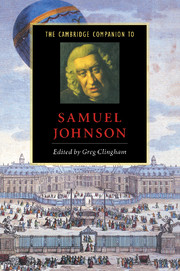Book contents
- Frontmatter
- Introduction
- 1 Extraordinarily ordinary
- 2 Johnson and the arts of conversation
- 3 Johnson's poetry
- 4 Johnson, the essay, and The Rambler
- 5 Johnson and the condition of women
- 6 Johnson's Dictionary
- 7 Johnson's politics
- 8 Johnson and imperialism
- 9 The skepticism of Johnson's Rasselas
- 10 Shakespeare
- 11 Life and literature in Johnson's Lives of the Poets
- 12 Johnson's Christian thought
- 13 “From China to Peru”
- 14 “Letters about nothing”
- 15 Johnson's critical reception
- Further reading
- Index
13 - “From China to Peru”
Johnson in the traveled world
Published online by Cambridge University Press: 28 May 2006
- Frontmatter
- Introduction
- 1 Extraordinarily ordinary
- 2 Johnson and the arts of conversation
- 3 Johnson's poetry
- 4 Johnson, the essay, and The Rambler
- 5 Johnson and the condition of women
- 6 Johnson's Dictionary
- 7 Johnson's politics
- 8 Johnson and imperialism
- 9 The skepticism of Johnson's Rasselas
- 10 Shakespeare
- 11 Life and literature in Johnson's Lives of the Poets
- 12 Johnson's Christian thought
- 13 “From China to Peru”
- 14 “Letters about nothing”
- 15 Johnson's critical reception
- Further reading
- Index
Summary
“When a man is tired of London, he is tired of life, for there is in London all that life can afford.” Johnson made this famous declaration in 1777, but he had already said something similar to James Boswell on 11 October 1773 whilst they were both temporarily marooned on the island of Coll in the Hebrides. Boswell had commented that until their joint expedition, “You yourself, sir, had never seen, till now, any thing but your native island,” to which Johnson replied “But, Sir, by seeing London, I have seen as much of life as the world can shew.” It seems clear that “life” in these pronouncements cannot mean whatever it was that Johnson had come to the Hebrides to see. London could encapsulate “life” because life everywhere – that is to say human character – is the same. London’s social and cultural diversity, the richness of its human resources, means that it is the perfect laboratory for the study of human nature. Johnson’s remarks can be read as testimony not only to his love of the city, but to his conviction that human beings are alike everywhere, the same, in fact, in London as (to use his phrase at the opening of The Vanity of Human Wishes) “from China to Peru.” What then had taken him to the highlands of Scotland?
- Type
- Chapter
- Information
- The Cambridge Companion to Samuel Johnson , pp. 209 - 223Publisher: Cambridge University PressPrint publication year: 1997
- 2
- Cited by

